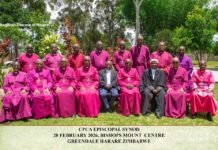The Anglican Consultative Council has adopted a resolution at its meeting in Hong Kong changing the way ecumenical statements are endorsed by the Anglican Communion.
Delegates to ACC-17 endorsed resolution “B17:04 Reception of Ecumenical Texts in the Anglican Communion” on 2 May at their meeting in Hong Kong. Put forward the Rev. Canon John Gibaut, the staff officer of the Unity, Faith and Order Commission of the ACC, the proposal moves the authority to receive or endorse ecumenical agreements from the bishops gathered at the Lambeth Conference to the ACC.
Dr. Gibaut explained the communion had not been able to receive ecumenical statements since the 1998 Lambeth Conference, necessitating this change. At Lambeth 2008 the organizers did away with voting in favor of an “indaba” or conversation process, which allowed an airing of views but did not allow decisions to be reached.
This transformation of Lambeth from a decision making body to a discussion group had caused a 21 year gap in the ecumenical reception process, Dr. Gibaut explained.
After an agreement had been reached, it would be sent to the UFO commission for review. If it were found to be consonant with Anglican doctrine and discipline it would be shared with the member churches of the communion, who would be given a deadline in which to comment. It would then be passed on to the ACC for implementation or action.
The text of the resolution states:
The Anglican Consultative Council endorses the following process for the reception of ecumenical texts in the Anglican Communion:
- When any ecumenical bilateral dialogue of the Anglican Communion has completed an agreed statement, it is first sent to IASCUFO.
- IASCUFO studies the agreed statement and reaches a common mind on whether it recognises the statement ‘as consonant with the faith of the Church as Anglicans have received it’. IASCUFO then prepares resources, advice, and draft recommendations to be taken to the next meeting of the ACC.
- The ACC then formally welcomes the agreed statement by resolution, and commends the text, together with IASCUFO’s advice, to the Member Churches of the Anglican Communion for study, reflection and response within a timeframe set by the ACC.
- At the meeting of IASCUFO immediately prior to an ACC, the members of the commission will be joined by an ACC reference group, comprising some members of the ACC for further reflection on ecumenical statements in the light of the provincial responses and any other considerations. The task of this enhanced commission will be to evaluate whether an agreed text has a sufficient level of consensus in the Member Churches for a recommendation to be made to the ACC.
- The Standing Committee nominates up to 15 people to form the ACC reference group. The constitution of this group is recommended to be:
- two primate members of ACC;
- two bishop members of ACC;
- two priest or deacon members of ACC;
- two lay members of ACC;
- relevant Anglican Co-Chairs of bilateral dialogue in question (e.g., with the Roman Catholic Church, the Orthodox Church, the Oriental Orthodox Churches, the Lutheran World Federation, the World Communion of Reformed Churches, the World Methodist Council, and any other new dialogue partner).
- two primate members of ACC;
- Having obtained sufficient support from the Member Churches, IASCUFO and the ACC reference group will then invite the ACC to recognise, by resolution, an ecumenical text ‘as consonant in substance with the faith of the Church as Anglicans have received it’ and as providing ‘a sufficient basis for taking the next steps towards the reconciliation of our Churches, grounded in agreement in faith’.
The decision by the ACC to supplant the Lambeth Conference as the entity which speaks for the church on matters of doctrine and discipline, represents a significant shift in the power structures of the church. It removes the bishops replacing it with an appointed staff and committee under the oversight of a London-based bureaucracy.
While the ACC has expanded its powers to oversee the bureaucratic process surrounding ecumenical relations, it does not yet have the authority to act on the agreements. Its constitution limits its authority to that of a consultative, not juridical, body; potentially setting up a clash between the bishops of the church and the London bureaucracy over church order and authority.




All according to plan . . .